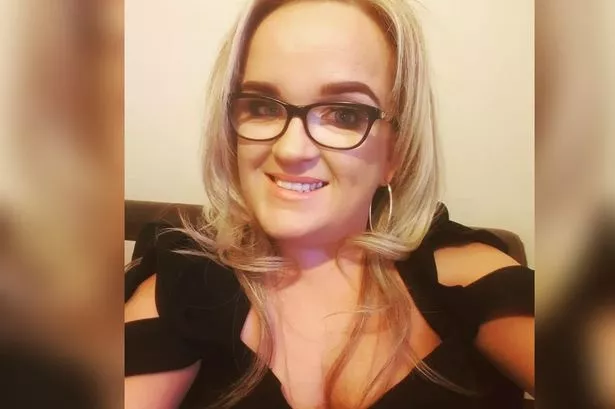Tributes have been paid to a "lovely" mum who died just months after doctors failed to spot the signs of a brain tumour.
Katie Flynn, from Bootle, was just 34 when she died after being diagnosed with a brain tumour, which a doctor at the Walton Centre initially failed to spot until it had grown by 10mm in size. An inquest held at Gerard Marjella Courthouse in Kirkdale on Wednesday heard there were a number of "missed opportunities" and failures in relation to Katie's care, including post-surgery.
Area Coroner Ms Anita Bhardwa concluded death by misadventure, contributed to by neglect. She said a Regulations 28 report, also known as a prevention of future deaths report, would be sent to the Society of British Neurological Surgeons and the NHS improvement department.
READ MORE: Try Liverpool Echo Premium for 99p with no ads, fun puzzles and brilliant new features
READ MORE: Coca-Cola truck will be back in Liverpool as date confirmed
Ms Bhardwa said: "It’s an absolute tragic set of circumstances that’s left two young children without their mum."
Katie was experiencing pain, including numbness and weakness in her arms and legs, when she was found to have a syrinx – a fluid filled cyst that forms within the spinal cord – on November 30, 2020. She was referred to a specialist spinal clinic followed by a pain team.
But when she continued to experience a variety of symptoms including pins and needles in her arms and legs, Katie was sent for an urgent MRI scan on 31 August, 2021. The inquest heard a doctor at the Walton Centre failed to spot the signs of the tumour on the scan.
It wasn't until months later on 13 December, 2021 that a consultant noted the MRI scan from August looked abnormal and requested a review, which confirmed a mass legion had been missed. Area Coroner Ms Bhardwa said this was a missed opportunity which significantly delayed the findings of the tumour and Katie’s treatment for several months.
The inquest heard it was not possible to say how much difference early treatment would have had on Katie's life expectancy but the risks associated with the tumour would have been the same. Professor Andrew Brodbelt, Consultant Neurosurgeon at the Walton Centre, said the treatment recommended to Katie of surgery, followed by chemotherapy and radiotherapy, would likely have been the same if the tumour had been correctly identified in August.
A biopsy in January 2021 confirmed the mum-of-two had a Atypical Teratoid Rhabdoid Tumour (ATRT) – a malignant and fast growing form of cancer that's most often diagnosed in children and is very rare in adults. She was the first adult at the Walton Centre to undergo surgery for this kind of tumour on 22 February, 2022.
The surgery was successful in removing a large part of the tumour but Katie was slow to wake up post-surgery and a CT scan found some blood. Doctors decided to leave the external ventricular drainage (EVD) in place to help drain the fluid from Katie's brain and she remained in intensive care, where she started to show signs of improvement.
On March 3, just days before she died, Katie developed a fever and a sepsis infection. The following day the EVD stopped draining the fluid in her brain and nurses alerted the on call doctor. The doctor asked if the fluid level was oscillating [if it was moving back and forth] and it was, so he wasn’t concerned.
However, when the same issue occurred again the following day, nurses failed to inform the on call doctor for four hours, during which time the drain in Katie's brain was draining little to no fluid – a situation which was critical for her.
Area Coroner Ms Bhardwa said the failure to escalate this issue to medical staff or inform them that Katie had a wet dressing, which could indicate the drain had been dislodged, was a "basic gross failure, namely neglect."
The inquest heard there was a lack of clear guidance for nursing staff on what to do in this situation, which more than likely contributed to this. It wasn't until around 4.25am on March 5 that nurses alerted medical staff after finding Katie with enlarged and unreactive pupils.
She was sent for an urgent CT scan which confirmed she had hydrocephalus, a build up of fluid in the brain, and the EVD drain in her brain had been dislodged. Katie died the following day, March 6, at the age of 34.
Ms Bhardwa said if the advice or involvement of the medical team been sought earlier it is more likely than not Katie would have survived at this time. The Walton Centre has changed its policy surrounding EVD drains following Katie's death and has written to other hospitals advising them to do the same.
Deputy Medical Director at The Walton Centre, Dr Sacha Niven, said: "The most important change really is we’ve taken out any ambiguity. If a drain is not draining for more than one hour medical staff are to be called. It’s clear oscillation doesn't matter anymore."
The coroner has also requested a prevention of future deaths report advising other hospitals across the country to review this policy. The medical cause of Katie's death was recorded as 1A Hydrocephalus (operated) caused by the displacement of External ventricular drain EVD, caused by the malignant brain tumour (operated).
Following the news of Katie's death, dozens of people took to Facebook to pay tribute to the "lovely girl".
Victoria Robinson said: "Rip Katie xx"
Mandy Bevan said: "This is heartbreaking. Them poor children left without their mum."
Marjie Hill said: "So sad, such a lovely girl."
Joyce Owen said: "This is happening too often now. Thoughts and prayers for family and friends."
Don't miss the biggest and breaking stories by signing up to the Echo Daily newsletter here
Get a free National Trust pass worth up to £50 for your family day out this autumn

